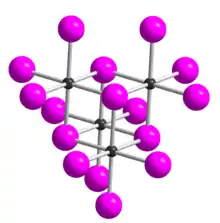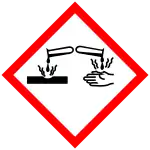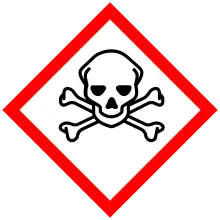 | |
| Identifiers | |
|---|---|
3D model (JSmol) |
|
| ChemSpider | |
| ECHA InfoCard | 100.030.070 |
| EC Number |
|
PubChem CID |
|
| UNII | |
CompTox Dashboard (EPA) |
|
| |
| |
| Properties | |
| TeBr4 | |
| Molar mass | 447.22 g/mol |
| Appearance | yellow-orange crystals |
| Density | 4.3 g/cm3, solid |
| Melting point | 388 °C (730 °F; 661 K)[1] |
| Boiling point | decomposes at 420 °C (788 °F; 693 K) |
| Structure | |
| monoclinic | |
| Hazards | |
| GHS labelling:[2] | |
  | |
| Danger | |
| H301, H314 | |
| P260, P264, P280, P301+P330+P331, P303+P361+P353, P304+P340, P305+P351+P338, P310, P321, P363, P405, P501 | |
| Related compounds | |
Other anions |
Tellurium tetrafluoride Tellurium tetrachloride Tellurium tetraiodide |
Other cations |
Selenium tetrabromide |
Related compounds |
Ditellurium bromide |
Except where otherwise noted, data are given for materials in their standard state (at 25 °C [77 °F], 100 kPa).
Infobox references | |
Tellurium tetrabromide (TeBr4) is an inorganic chemical compound. It has a similar tetrameric structure to TeCl4.[3] It can be made by reacting bromine and tellurium.[4] In the vapour TeBr4 dissociates:[3]
- TeBr4 → TeBr2 + Br2
It is a conductor when molten, dissociating into the ions TeBr3+ and Br−. When dissolved in benzene and toluene, TeBr4 is present as the unionized tetramer Te4Br16.[3] In solvents with donor properties such as acetonitrile, CH3CN ionic complexes are formed which make the solution conducting:
- TeBr4 + 2CH3CN → (CH3CN)2TeBr3+ + Br−
References
- ↑ Thermochemical Data of Elements and Compounds", M. Binnewies, E. Milke, Wiley-VCH, 2002, ISBN 3-527-30524-6
- ↑ "C&L Inventory". echa.europa.eu.
- 1 2 3 Inorganic Chemistry,Egon Wiberg, Arnold Frederick Holleman Elsevier 2001 ISBN 0-12-352651-5
- ↑ Greenwood, Norman N.; Earnshaw, Alan (1997). Chemistry of the Elements (2nd ed.). Butterworth-Heinemann. ISBN 978-0-08-037941-8.
This article is issued from Wikipedia. The text is licensed under Creative Commons - Attribution - Sharealike. Additional terms may apply for the media files.